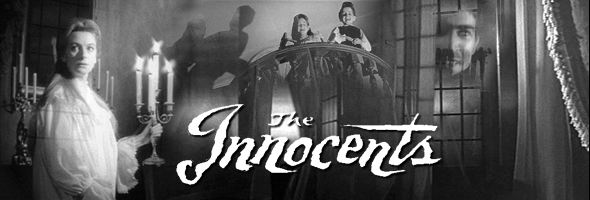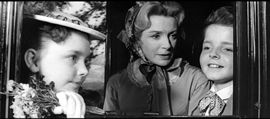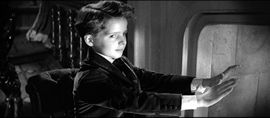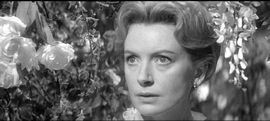
B&W, 1961, 100m.
Directed by Jack Clayton
Starring Deborah Kerr, Martin Stephens, Pamela Franklin, Megs Jenkins, Michael Redgrave, Peter Wyngarde, Clytie Jessop
Criterion (Blu-ray & DVD) (US RA/R1 HD/NTSC), BFI (Blu-ray, DVD) (UK RB/2 HD/PAL), Fox (US R1 NTSC) / WS (2.35:1) (16:9)
 Hired by a rich, hands-off uncle (Redgrave) in London, vicar's daughter Miss Giddens (Kerr) becomes the new governess of two orphaned children at the remote countryside manor of Bly House. The young girl, Flora (Franklin), is a happy girl who enjoys playing with her turtle and seems oblivious to the fact that Miss Giddens' predecessor, Miss Jessel (Jessop), died under mysterious circumstances. Flora makes odd references to the fact that her brother Miles (Stephens) will be coming home soon despite the boarding school holiday being far off, and indeed, he is soon shipped back home after being expelled for corrupting behavior against the other schoolchildren. All seems well enough at first, but soon Miss Giddens notices the uncanny appearances of spectral figures around the property including Miss Jessel and a sinister man, Quint (Wyngarde), a groundsman who also died around the same time. Convinced the children are falling under the diabolical spell of these two depraved spirits, Miss Giddens takes drastic measures to save them at any cost.
Hired by a rich, hands-off uncle (Redgrave) in London, vicar's daughter Miss Giddens (Kerr) becomes the new governess of two orphaned children at the remote countryside manor of Bly House. The young girl, Flora (Franklin), is a happy girl who enjoys playing with her turtle and seems oblivious to the fact that Miss Giddens' predecessor, Miss Jessel (Jessop), died under mysterious circumstances. Flora makes odd references to the fact that her brother Miles (Stephens) will be coming home soon despite the boarding school holiday being far off, and indeed, he is soon shipped back home after being expelled for corrupting behavior against the other schoolchildren. All seems well enough at first, but soon Miss Giddens notices the uncanny appearances of spectral figures around the property including Miss Jessel and a sinister man, Quint (Wyngarde), a groundsman who also died around the same time. Convinced the children are falling under the diabolical spell of these two depraved spirits, Miss Giddens takes drastic measures to save them at any cost.
 This superb ghost story was the first big screen adaptation of Henry James' novella The Turn of the Screw, a pioneering work of ambiguous, psychoanalytical horror which inspired countless subsequent works, most prominently Shirley Jackson's The Haunting of Hill House (which in turn was filmed two years after this as The Haunting, against which The Innocents is usually debated as to which is the best '60s ghost story on film). Using much of the talent behind the camera from John Huston's Beat the Devil, this was an unusual change of pace as the second film for director Jack Clayton, a talented if not terribly prolific director who had just scored a major international success with the gritty, realistic Room at the Top. The screenplay was co-written by Truman Capote (along with John Mortimer, lifting many elements as well from William Archibald's Broadway play which originated in 1950), who cleverly finds many visual and verbal means of communicating James' tricky concepts on film using layers of complex symbolism involving flowers, reflections, and distorted light. Also impressive are the performances, with Kerr and the two child actors carrying most of the burden incredibly well. It's not surprising little Franklin went on to a long and successful career for decades in films ranging from The Prime of Miss Jean Brodie to The Legend of Hell House (as well as some less impressive efforts for Bert I. Gordon), though
This superb ghost story was the first big screen adaptation of Henry James' novella The Turn of the Screw, a pioneering work of ambiguous, psychoanalytical horror which inspired countless subsequent works, most prominently Shirley Jackson's The Haunting of Hill House (which in turn was filmed two years after this as The Haunting, against which The Innocents is usually debated as to which is the best '60s ghost story on film). Using much of the talent behind the camera from John Huston's Beat the Devil, this was an unusual change of pace as the second film for director Jack Clayton, a talented if not terribly prolific director who had just scored a major international success with the gritty, realistic Room at the Top. The screenplay was co-written by Truman Capote (along with John Mortimer, lifting many elements as well from William Archibald's Broadway play which originated in 1950), who cleverly finds many visual and verbal means of communicating James' tricky concepts on film using layers of complex symbolism involving flowers, reflections, and distorted light. Also impressive are the performances, with Kerr and the two child actors carrying most of the burden incredibly well. It's not surprising little Franklin went on to a long and successful career for decades in films ranging from The Prime of Miss Jean Brodie to The Legend of Hell House (as well as some less impressive efforts for Bert I. Gordon), though  one can only wonder why the terrific Stephens, already a veteran from Village of the Damned and The Hellfire Club, threw in the towel as an actor soon afterwards and became an architect instead. However, the real star of this show is easily cinematographer Freddie Francis, working in Cinemascope for the first time (at the insistence of 20th Century-Fox) to deliver one of the most brilliantly photographed horror films of all time. Every shot is perfectly realized, with the extreme periphery of the frame often used to deliver unexpected jolts including the most frightening game of hide and seek ever filmed.
one can only wonder why the terrific Stephens, already a veteran from Village of the Damned and The Hellfire Club, threw in the towel as an actor soon afterwards and became an architect instead. However, the real star of this show is easily cinematographer Freddie Francis, working in Cinemascope for the first time (at the insistence of 20th Century-Fox) to deliver one of the most brilliantly photographed horror films of all time. Every shot is perfectly realized, with the extreme periphery of the frame often used to deliver unexpected jolts including the most frightening game of hide and seek ever filmed.
No home theater regardless of size can quite capture the intense experience of watching The Innocents in a movie theater with a large screen and a jittery audience (seriously-- try to catch a repertory screening if you can), but the Blu-rays come as close as possible. The crisp transfer first issued in the U.K. from the BFI is an appreciable leap in every respect over their previous DVD edition (and an even bigger vault past the American Fox DVD, which featured a weaker, softer appearance); however, it's important to remember that the film features a number of elaborate optical effects achieved through intense lighting, fades, superimpositions, and even the intentional degradation of a few exterior wide shots of Miss Jessel to make her appearances less distinct. That said, the disc accurately represents the cinematic texture of the film from start to finish, with only some extremely minor damage (most noticeably a quick vertical scratch during the fade after the opening credits) in evidence. Optional English subtitles are thankfully provided for the main feature as well as all of the extras. This Region B release (sorry, that's presumably Fox's mandate as BFI discs are usually region free) is defintely recommended for fans of the film and might be enough incentive alone to pick up a multi-region player. The supplements are carried over from the BFI's prior DVD release and are very highly recommended as well. Professor Christopher Frayling contributes a crackerjack audio commentary that covers pretty much anything you could want to know about the film in enough detail to fill up a book. From the techniques Francis used to pull off Clayton's script notes to Capote's amount of input to little elements taken from Benjamin Britten's opera adaptation, it's an essential track that couldn't be better. Frayling also appears for a "video introduction" that actually clocks in at half an hour(!) in which he stands at one of the film's most memorable locations and provides more of a capsule summary of his insights into the film. Also carried over from the DVD are the ridiculous American trailer (which looks more like a Corman/Poe film) and Clayton's Oscar-winning 1955 short film, "The Bespoke Overcoat," also transferred here in HD. It's an interesting adaptation of a melancholy Nikolai Gogol short story with supernatural elements about a low-paid coat factory employee (The Fearless Vampire Killers' Alfie Bass) whose desire for a solid new overcoat, and the rejection of same from his unappreciative boss, leads him to request the creation of one in a journey that continues beyond his deathbed. Th unusual and haunting interpolation of Russian and Jewish culture makes this an unexpected gem, with a heartbreaking Bass and the equally good David Kossoff pulling off what amounts to a two-character chamber piece with equal amounts of humor and surrealism.
But that's not all. The Blu-ray adds two new extras, kicking off with "Designed by Motley," a fascinating 15-minute featurette about the three-woman costuming company which provided the striking clothes seen in many of Britain's most visually striking films including The Innocents (of course) and David Lean's Great Expectations. Also included is Clayton's very rare first short, "Naples Is a Battlefield," a Ministry of Information documentary showing the massive devastation wreaked upon the people and buildings of Naples visible only after its liberation by Allied forces. Grim and beautifully constructed, it's very different from the other material on the disc but equally worthwhile. (And it's really strange how much the uncredited narrator sounds like Richard Burton!) A booklet includes liner notes by The League of Gentlemen and future Ghost Stories creator Jeremy Dyson. The subsequent release from Criterion (as separate Blu-ray and DVD editions) also looks excellent and also performs a bit of digital trickery to minimize the "CinemaScope mumps" effect, with actors' faces now in more normal propotions. The Frayling intro and commentary are ported over here, with other extras including a new interview with cinematographer and future AMPAS President John Bailey about Freddie Francis, a newly-edited compilation of 2006 interviews (with Francis, editor Jim Clark, and script supervisor Pamela Mann Francis), and the trailer, plus liner notes by Maitland McDonagh.



 Hired by a rich, hands-off uncle (Redgrave) in London, vicar's daughter Miss Giddens (Kerr) becomes the new governess of two orphaned children at the remote countryside manor of Bly House. The young girl, Flora (Franklin), is a happy girl who enjoys playing with her turtle and seems oblivious to the fact that Miss Giddens' predecessor, Miss Jessel (Jessop), died under mysterious circumstances. Flora makes odd references to the fact that her brother Miles (Stephens) will be coming home soon despite the boarding school holiday being far off, and indeed, he is soon shipped back home after being expelled for corrupting behavior against the other schoolchildren. All seems well enough at first, but soon Miss Giddens notices the uncanny appearances of spectral figures around the property including Miss Jessel and a sinister man, Quint (Wyngarde), a groundsman who also died around the same time. Convinced the children are falling under the diabolical spell of these two depraved spirits, Miss Giddens takes drastic measures to save them at any cost.
Hired by a rich, hands-off uncle (Redgrave) in London, vicar's daughter Miss Giddens (Kerr) becomes the new governess of two orphaned children at the remote countryside manor of Bly House. The young girl, Flora (Franklin), is a happy girl who enjoys playing with her turtle and seems oblivious to the fact that Miss Giddens' predecessor, Miss Jessel (Jessop), died under mysterious circumstances. Flora makes odd references to the fact that her brother Miles (Stephens) will be coming home soon despite the boarding school holiday being far off, and indeed, he is soon shipped back home after being expelled for corrupting behavior against the other schoolchildren. All seems well enough at first, but soon Miss Giddens notices the uncanny appearances of spectral figures around the property including Miss Jessel and a sinister man, Quint (Wyngarde), a groundsman who also died around the same time. Convinced the children are falling under the diabolical spell of these two depraved spirits, Miss Giddens takes drastic measures to save them at any cost.
 This superb ghost story was the first big screen adaptation of Henry James' novella The Turn of the Screw, a pioneering work of ambiguous, psychoanalytical horror which inspired countless subsequent works, most prominently Shirley Jackson's The Haunting of Hill House (which in turn was filmed two years after this as The Haunting, against which The Innocents is usually debated as to which is the best '60s ghost story on film). Using much of the talent behind the camera from John Huston's Beat the Devil, this was an unusual change of pace as the second film for director Jack Clayton, a talented if not terribly prolific director who had just scored a major international success with the gritty, realistic Room at the Top. The screenplay was co-written by Truman Capote (along with John Mortimer, lifting many elements as well from William Archibald's Broadway play which originated in 1950), who cleverly finds many visual and verbal means of communicating James' tricky concepts on film using layers of complex symbolism involving flowers, reflections, and distorted light. Also impressive are the performances, with Kerr and the two child actors carrying most of the burden incredibly well. It's not surprising little Franklin went on to a long and successful career for decades in films ranging from The Prime of Miss Jean Brodie to The Legend of Hell House (as well as some less impressive efforts for Bert I. Gordon), though
This superb ghost story was the first big screen adaptation of Henry James' novella The Turn of the Screw, a pioneering work of ambiguous, psychoanalytical horror which inspired countless subsequent works, most prominently Shirley Jackson's The Haunting of Hill House (which in turn was filmed two years after this as The Haunting, against which The Innocents is usually debated as to which is the best '60s ghost story on film). Using much of the talent behind the camera from John Huston's Beat the Devil, this was an unusual change of pace as the second film for director Jack Clayton, a talented if not terribly prolific director who had just scored a major international success with the gritty, realistic Room at the Top. The screenplay was co-written by Truman Capote (along with John Mortimer, lifting many elements as well from William Archibald's Broadway play which originated in 1950), who cleverly finds many visual and verbal means of communicating James' tricky concepts on film using layers of complex symbolism involving flowers, reflections, and distorted light. Also impressive are the performances, with Kerr and the two child actors carrying most of the burden incredibly well. It's not surprising little Franklin went on to a long and successful career for decades in films ranging from The Prime of Miss Jean Brodie to The Legend of Hell House (as well as some less impressive efforts for Bert I. Gordon), though  one can only wonder why the terrific Stephens, already a veteran from Village of the Damned and The Hellfire Club, threw in the towel as an actor soon afterwards and became an architect instead. However, the real star of this show is easily cinematographer Freddie Francis, working in Cinemascope for the first time (at the insistence of 20th Century-Fox) to deliver one of the most brilliantly photographed horror films of all time. Every shot is perfectly realized, with the extreme periphery of the frame often used to deliver unexpected jolts including the most frightening game of hide and seek ever filmed.
one can only wonder why the terrific Stephens, already a veteran from Village of the Damned and The Hellfire Club, threw in the towel as an actor soon afterwards and became an architect instead. However, the real star of this show is easily cinematographer Freddie Francis, working in Cinemascope for the first time (at the insistence of 20th Century-Fox) to deliver one of the most brilliantly photographed horror films of all time. Every shot is perfectly realized, with the extreme periphery of the frame often used to deliver unexpected jolts including the most frightening game of hide and seek ever filmed.
![]()